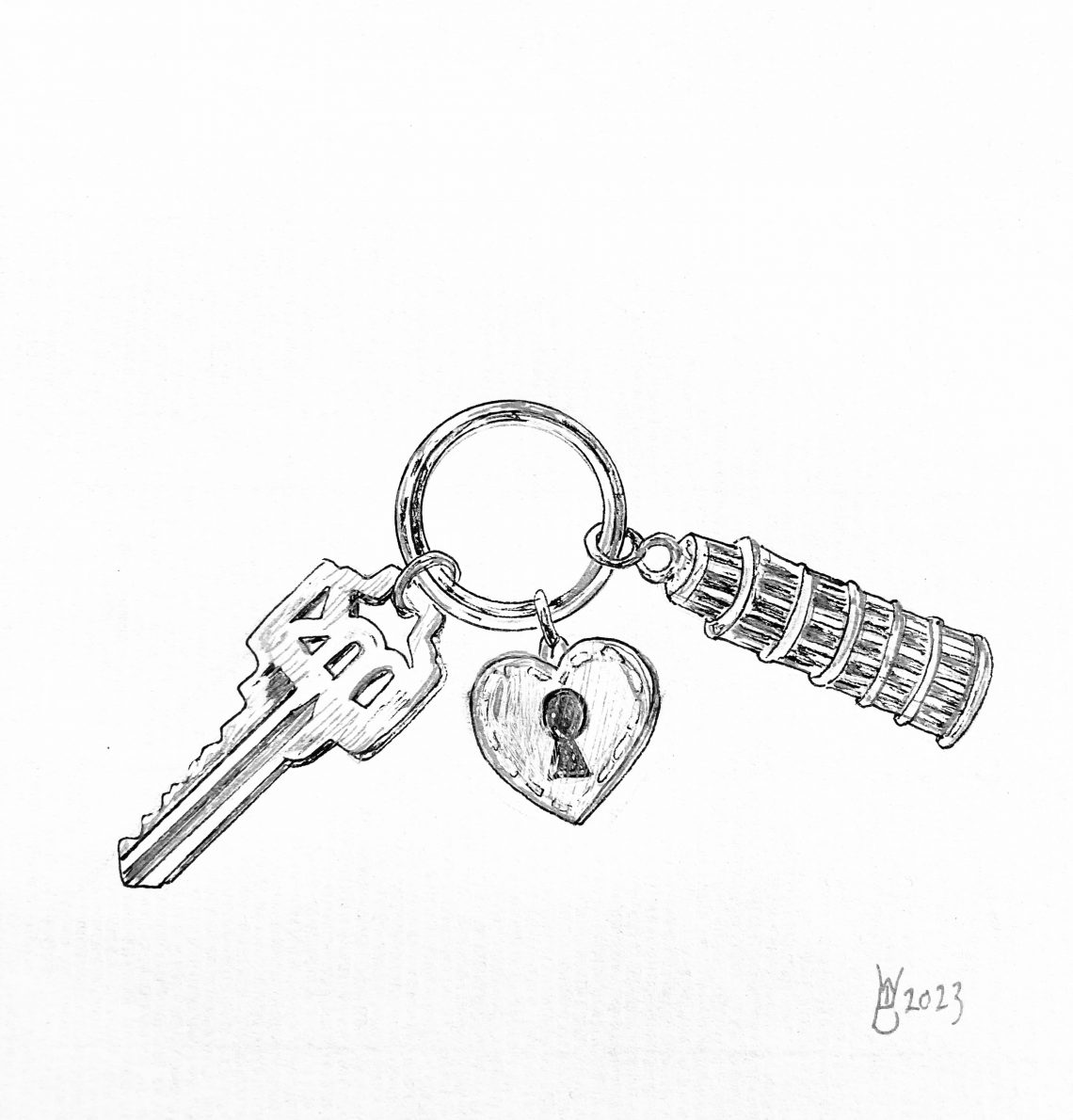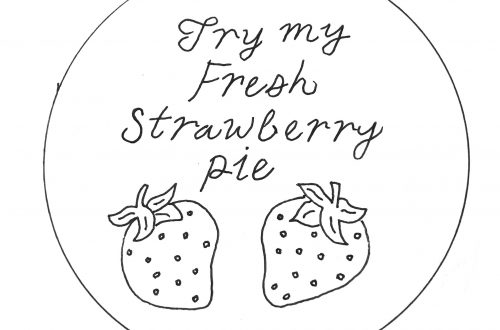by Nate Crawford
Nate’s essay appears in episode 43 of The Dirty Spoon Radio Hour.
My first real understanding of fancy food was homemade pasta. I knew that it was fancy because I could see just how much time it took and how much effort was involved. And, like most fancy things, I saw that homemade pasta was a rarity. My family would make it about once a year and it was always a big production. My parents would pull out the pasta roller my great-aunt gave them as a wedding present and then drive my brother and I to the specialty grocery store on the other side of Omaha. Once we were back home, we would all take turns stirring and kneading and complaining. The thing that always sticks out in my memory is that making homemade pasta would take over our entire weekend. Between shopping for the pasta ingredients, making the pasta sauce, rolling out the pasta dough, and cleaning the pasta mess, there wasn’t time for much else. With the inclusion of children and an average amount of family dysfunction, an afternoon’s worth of work would stretch out over days.
And as my first real understanding of fancy food, it was also one of the first times I had to ask myself: Do I hate fancy food? This pasta sauce didn’t taste like the jarred marinara I loved at all. It wasn’t sweet. It wasn’t bright and acidic. It was barely red. This sauce, for some sick and twisted reason, had carrots in it. Carrots! And as a child with a strong brand loyalty to bow tie shaped farfalle pasta, I was not exactly impressed by hand cut tagliatelle. I was happy to leave everything up to the experts at Ragu and Barilla.
I find it a little embarrassing how long it took for me to fully come around to loving homemade pasta. In my early twenties, I started cooking a lot more. It started because after college I was suddenly responsible for all of the food I was eating, but it continued because I was really enjoying myself. Then one year, my mom had a birthday. I asked her if there was anything she wanted me to make, and she said that she wanted homemade pasta. I agreed to make bolognese and my dad agreed to make the tagliatelle and I was silently furious. It had been years since I was home for a pasta weekend, but I figured I still more or less remembered what it tasted like. As I spent a long afternoon cutting carrots and pouring milk and wine over ground beef, I was wishing that my mom had picked something different. But in the end, it tasted amazing. How had I ever wanted anything else?
Ultimately, I think it was inevitable that homemade pasta would win me over. It is just that delicious. And it is homemade pasta that brings me to last winter when I was locked out of my apartment.
Getting locked out of my apartment has always been a terrible fear of mine. As a frightened little fraidy cat, I am incredibly disciplined about checking my pockets for keys. I smack my pockets to hear the keys jingle and then ball them up in my fist before walking out the door. Walking through the tiny courtyard to my apartment building, I smacked my pocket and heard the sound I was hoping for. When I took the keys out, however, I discovered that my key ring was newly bent and the key to my apartment door had escaped. I stood outside in the Chicago winter, panicking.
For some, I realize that the fear of being locked out might be a foreign concept. I have large parts of my family who live in the cozy sorts of towns where they still leave their doors unlocked. But I grew up in a door-locking household. My parents always locked the doors and I learned from watching them. I’ve locked the door everywhere I’ve lived since. From Nebraska to Philadelphia to Chicago, I’m always locking doors. I’m a fiend for the thing!
My grandmother used to leave her door unlocked. The next neighbor was a mile away and it is probably fair to say that anyone who was willing to travel down the long gravel road to her home to steal her cathode ray tube television or rusting exercise bike probably wouldn’t have been stopped by a deadbolt. That said, it also meant that people would just appear. If I was making rice krispie treats in the kitchen and heard a ruckus in the garage, I was just supposed to assume that those ruckus makers were either related to me or friends of my grandmother and that everything was fine. And everything always was fine. But that is not how I want to live my life. I do not want the barrier between me and the outside world to be a dotted line. I like the clarity of knowing when I am alone and knowing that I have control over when or if that changes. It is literally a feeling of security.
The irony, of course, is that locking my door is also the first step in locking myself out of my apartment. In my nightmares, getting locked out always looks the same. First, my phone immediately dies. Or maybe it gets stolen by a rabid dog or a cash-strapped bird of prey. I consider trying to borrow some stranger’s phone, but realize that I do not know anyone’s phone number from memory. At best, I could ask whether they would mind me logging onto Instagram on their phone and hope that some of my friends have fallen off the wagon of their social media detox. Unable to get into my apartment or call for help, I am left to walk from friend’s apartment to friend’s apartment, hoping someone will be home. Naturally, no one is and I slowly start to disappear like I’m a character in Back to the Future.
My tears freezing in the courtyard, I was thrilled to find that my phone was not dead and all of the phone-snatching falcons I was worried about had gone south for the winter. I called my girlfriend, Emily, who invited me over and promised we’d sort it all out.
Emily and I met in an improv comedy class, which never gets any less embarrassing to say. She was unstoppably funny, confidently calm, and tall as hell. I’m 6’6”, so I was desperate for the 6’2” stunner with the pancake tattoo to notice me. Over the course of a month, texting turned into trading books, which turned into propper dates that turned into spending almost all of our time together.
By the time I got locked out of my apartment, things were only just starting to get serious. We were used to saying “I love you,” but no one had met anyone’s parents yet. We were starting to talk about the future, but that future didn’t stretch much beyond Christmas. Calling Emily with a problem was nothing new, but I was mortified to call crying over a closed door.
Complicating matters slightly, my apartment building was in a bit of a transitional phase. By transitional phase, I mean that my property’s manager had recently been fired with a strange mixture of fanfare and apology. I still don’t know what she did wrong, but I do know that her email response time showed the sort of poor work/life balance that I really needed when I found myself locked out of my apartment on a Friday night. Without her, I had no clue who to call. There was an emergency locksmith’s number online, and they could come for a price–$100 to unlock the door plus $50 for coming on the weekend–but I still wouldn’t have a key. And I had to be at work that weekend, meaning that I’d either have to leave my door unlocked or pay $150 every day until Monday.
So, somewhat quickly, heading over to Emily’s place while I sorted things out turned into staying with Emily for the weekend. When one of your worst fears comes true, there are worse consequences. Emily and I watched movies, played card games, and ate chicken fingers very carefully so as to not get any crumbs in her bed. The weekend could have been a lovely staycation if I wasn’t absolutely falling apart. A mixture of general anxiety, guilt, and a lack of clean clothes took its toll. I’m already a pretty feeble person, so I didn’t have too far to fall. Emily was endlessly welcoming, but I couldn’t relax.
By Sunday, I was really dragging. I got back from work just in time to see Emily leave to catch a train to a bus to the Skokie Theatre to see our friend in a Tennessee Williams play. I hit the bed hard.
Restlessly exhausted, I found myself overwhelmed with gratitude. How lucky was I to have somewhere to go? To have someone to help me out? And how lucky for that someone to be so sweet and kind and wonderful; that there is somewhere so full of jokes and generosity and love. I realized I needed to act on these feelings. And then it hit me. What do you do when you want to do something nice for the person you love and you have five hours before your girlfriend is back from Cat on a Hot Tin Roof? Make bolognese from scratch.
The first step, of course, was to buy the pasta ingredients. Heading to my local Kroger, I was checking every thirty seconds to make sure I had not lost Emily’s keys, too. I don’t know if I’ve ever gripped a carabiner tighter. I quickly gathered everything I needed–tomatoes, beef, nutmeg, even some blasted carrots–and hurried back to Emily’s to finish my big surprise dinner before her return. The cold and the pain it inflicts does wonders for keeping me on a deadline.
Saying that the secret ingredient to any dish is love has become a bit of a joke. I’m more likely to say it laughingly as I hand someone a 7/11 coffee than I am after baking a delicious apple crumble. But there is an enthusiasm I adopt when making food for someone I care about; an enthusiasm that pairs oh so well with a bolognese sauce. I become so precious about my onions and carrots, so attentive as it simmers for hours. The feeling is almost like a runner’s high. At first, I felt tired and overwhelmed, quickly spreading a mess around someone else’s kitchen before I’d even gotten a pot on the stove. But soon, the sweat, the stress, the mess turned into a joy. Every action brought me closer to someone I love, even while they were in the suburbs watching our friend hobble around on crutches with a Southern accent.
Standing over a big pot of bubbling goo–stirring constantly and waiting for the milk to boil off–I was struck by a strong sense of connection. I started imagining the centuries of people who had spent far more afternoons than me over their own big pot; cooks, chefs, and hash slingers making the absolute best food they can to show their love to the people they care about. I started thinking about my grandmother making bacon, eggs, and hot chocolate from scratch every morning for my mother who just wanted to eat cereal. I started thinking about the professor at Indiana University who adopted my parents in grad school and would spend Saturday afternoons at the stove making matar paneer. I thought about my own parents and the soups and pot roasts and spinach rolls they worked so hard on. And in it all, I was so happy to be part of that lineage of love.
The next morning, I walked to a small office on the ground floor of another apartment building and picked up a new key. The woman in the office told me, “You know, you really gotta keep a backup key somewhere.” And now I do. That night, I took my keys to the hardware store and gave a copy to Emily.
Original artwork by Claire Winkler
About the Author
 Nathan Crawford is 6’6″ and used to be afraid of cows. Now an adult, he is a writer living in Chicago. He writes the East Nebraska Secret Commune Social Quarterly. See his other writing for Dirty Spoon here.
Nathan Crawford is 6’6″ and used to be afraid of cows. Now an adult, he is a writer living in Chicago. He writes the East Nebraska Secret Commune Social Quarterly. See his other writing for Dirty Spoon here.






